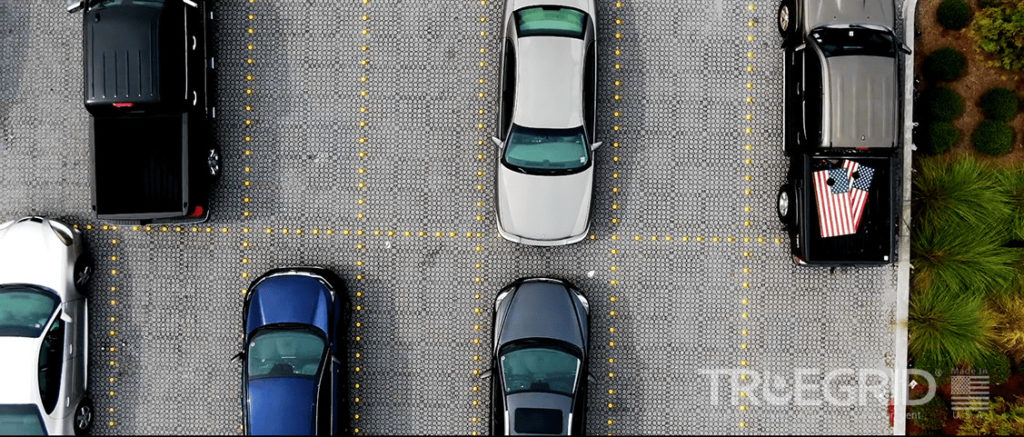
If you’ve ever owned a parking lot designed for tractor-trailers, you know that the weight of these enormous vehicles takes a serious toll on the pavement they park on. This is one of the reasons why tractor-trailers are banned from parking in so many areas and it makes the need for appropriate tractor-trailer parking that much more important.
Designing the perfect parking lot for a tractor-trailer isn’t as simple as it may seem, however. Aside from requiring unique dimensions and parking spaces, these lots also need to be as durable as possible so that you aren’t faced with the cost of constant upkeep and repairs.
In case you need a new parking lot for tractor-trailers, let’s take a look at the various materials used to build these lots and what might be the best choice for you.
Common Materials Used for Building Tractor-Trailer Parking Lots

Asphalt
Asphalt is far and away the most common material used when building parking lots of all shapes and sizes. This rings true for tractor-trailer parking lots as well, though it’s not necessarily the best choice. Some of the benefits of asphalt include the fact that it is somewhat durable..but not under tractor trailer loading, rather affordable, and can make for a nice parking lot for up to 5 years before it needs major maintenance.
The cons of asphalt outweigh the pros, unfortunately. Asphalt needs to be resealed every 5 years or so. This involves spreading one or more coats of sealant across the entire lot and letting it dry.
Asphalt also needs to be resurfaced every 10 years or some, which involves the removal and total replacement of the top layer of your asphalt lot. This is as labor intensive as it sounds, and costly to boot. This maintenance can take days or even upwards of a week to complete.

Asphalt is also an impermeable material, meaning water cannot pass through a regular asphalt parking lot unless it’s of the pervious variety. Both pervious asphalt and concrete aren’t suitable for the intense weight and pressure of tractor-trailers, however, so considering them as a viable alternative is a moot point.
The impermeability of asphalt means that you’ll need to use either sloping and slot drains, trench drains, and/or off-site storage basins to manage the flow of runoff stormwater. This adds to the cost and timeline of a tractor-trailer parking lot installation project immensely, and the piping required to manage stormwater will need maintenance occasionally, too.
Concrete
Concrete is another paving material that is used in a tractor without trailer parking lot design. It’s less common than asphalt and rarely used in lots designed to house due to concrete’s higher installation costs.
Hot weather can make asphalt sticky and make an asphalt lot scorching hot thanks to the heat island effect. Concrete, on the other hand, becomes very fragile in cold weather and can easily crack, especially if the foundation is uneven or water damage has already taken a toll on the lot.
A tractor-trailer parking design made from concrete generally has the same pros and cons as asphalt except that one is vulnerable to hot weather, while the other is vulnerable to cold. Concrete is also known to be more expensive than asphalt and can take longer to install thanks to the drying times and multiple coats required during installation.
Permeable Pavement

Another option for you when creating a tractor-trailer parking lot design is to use permeable pavement. Permeable pavement with the ability to support tractor-trailers has just recently been invented by companies like TRUEGRID and others, so there isn’t as much of a precedent for it yet.

However, in time we can expect this material to become the standard for tractor-trailer parking lots because of its positive characteristics. For starters, TRUEGRID PRO PLUS pavers are literally durable enough to handle H20 and HS20 loading…anything you will see on the road TRUEGRID can handle.
So, it goes without saying that they can handle the stress and pressure of everyday tractor-trailers as well. They will last at least 25 years before needing replacement, in fact. And that’s with almost no maintenance required.

TRUEGRID PRO PLUS pavers are also 100%-permeable, further lessening the cost of installation by eliminating the need for additional drainage systems and maintenance on said drainage systems.
They achieve this level of permeability by using gravel-filled pavers over a gravel subsurface of about 12 inches deep for tractor trailer traffic. This allows the pavers to drain stormwater at an incredibly high rate and renders them virtually invulnerable to flooding or water damage.
Let TRUEGRID Handle Your Tractor Trailer Parking Lot Paving Needs
When it comes to the cons of TRUEGRID PRO PLUS pavers for tractor-trailer parking lots, there really are none. The finished product looks different than asphalt or concrete but still appears clean-cut and professional, with many even preferring it to traditional pavement. Besides that, TRUEGRID permeable pavers outperform asphalt and concrete in every other meaningful metric for tractor-trailer parking lots.
Don’t saddle yourself with a commitment to costly maintenance and additional drainage systems by building a tractor-trailer parking lot from asphalt or concrete. If you want the best solution for your trucks and your wallet, call TRUEGRID today to link up with a pavement professional who can get you started.



